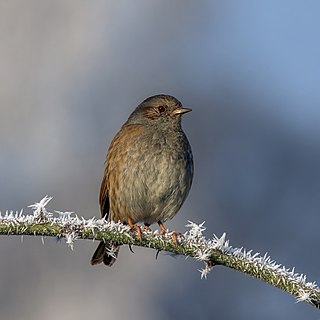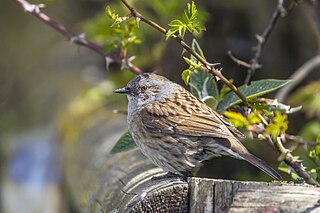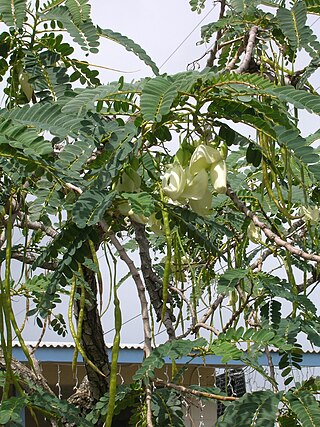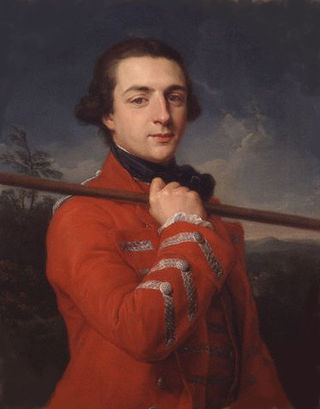
Prunella Margaret Rumney West Scales is a retired English actress. She portrayed Sybil Fawlty, the bossy wife of Basil Fawlty, in the BBC comedy Fawlty Towers, Queen Elizabeth II in A Question of Attribution by Alan Bennett and appeared in the documentary series Great Canal Journeys (2014–2021), travelling on narrowboats with her husband, fellow actor Timothy West.

The accentors are a genus of birds in the family Prunellidae, which is endemic to the Old World. This small group of closely related passerines are all in the genus Prunella. All but the dunnock and the Japanese accentor are inhabitants of the mountainous regions of Europe and Asia; these two also occur in lowland areas, as does the Siberian accentor in the far north of Siberia. These birds are not strongly migratory, but they will leave the coldest parts of their range in winter and make altitudinal movements.

The dunnock is a small passerine, or perching bird, found throughout temperate Europe and into Asian Russia. Dunnocks have also been successfully introduced into New Zealand. It is the most widespread member of the accentor family; most other accentors are limited to mountain habitats. Other, largely archaic, English names for the dunnock include hedge accentor, hedge sparrow, hedge warbler, and titling.

The alpine accentor is a small passerine bird in the family Prunellidae, which is native to Eurasia and North Africa.

Magnolia grandiflora, commonly known as the southern magnolia or bull bay, is a tree of the family Magnoliaceae native to the Southeastern United States, from Virginia to central Florida, and west to East Texas. Reaching 27.5 m (90 ft) in height, it is a large, striking evergreen tree, with large, dark-green leaves up to 20 cm long and 12 cm wide, and large, white, fragrant flowers up to 30 cm (12 in) in diameter.

Prunella is a genus of herbaceous plants in the family Lamiaceae, also known as self-heals, heal-all, or allheal for their use in herbal medicine.

Prunus serrulata or Japanese cherry is a species of cherry tree that grows naturally in Japan, China, Korea, and Vietnam, and it also refers to a cultivar produced from Prunus speciosa, a cherry tree endemic in Japan. Historically, the Japanese have developed many cultivars by selective breeding of cherry trees, which are produced by the complicated crossing of several wild species, and they are used for ornamental purposes all over the world. Of these, the cultivars produced by complex interspecific hybrids based on the Oshima cherry are also known as the Cerasus Sato-zakura Group.

Sesbania grandiflora, commonly known as vegetable hummingbird, katurai, agati, or West Indian pea, is a small leguminous tree native to Maritime Southeast Asia and Northern Australia. It has edible flowers and leaves commonly eaten in Southeast Asia and South Asia.

Pinguicula grandiflora, commonly known as the large-flowered butterwort, is a temperate insectivorous plant in the Lentibulariaceae family. One distinguishing feature of the species is its flower, which is much larger than the average for the genus.

Malope trifida is a species of Malope native to the Western Mediterranean Region. This plant is often used as an ornamental plant.

Prunella vulgaris, the common self-heal, heal-all, woundwort, heart-of-the-earth, carpenter's herb, brownwort or blue curls, is an herbaceous plant in the mint family Lamiaceae.

Digitalis grandiflora, the yellow foxglove, big-flowered foxglove, or large yellow foxglove, is a species of flowering plant in the genus Digitalis, family Plantaginaceae. It is native to southern Europe and Asia. In mountains it grows on warm, bushy slopes or areas left after logging. The Latin specific epithet grandiflora means “large flowered”.

Coreopsis grandiflora is a North American species of perennial plant in the family Asteraceae. The common name is large-flowered tickseed. It is found in eastern Canada and much of the United States, especially the south-central part of the country. The species is widely cultivated in China and naturalized there.

Coreopsis verticillata is a North American species of tickseed in the sunflower family. It is found primarily in the east-central United States, from Maryland south to Georgia, with isolated populations as far west as Oklahoma and as far north as Québec and Ontario. The common names are whorled tickseed, whorled coreopsis, thread-leaved tickseed, thread leaf coreopsis, and pot-of-gold.

Clematis montana, the mountain clematis, also Himalayan clematis or anemone clematis, is a flowering plant in the buttercup family Ranunculaceae. A vigorous deciduous climber, in late spring it is covered with a mass of small blooms for a period of about four weeks. The odorous flowers are white or pink, four-petalled, with prominent yellow anthers. It is native to mountain areas of Asia from Afghanistan to Taiwan.

Trifurcula headleyella is a moth of the family Nepticulidae. It is found in all Europe, with the possible exception of Ireland and the Mediterranean islands

Prunella is a 1918 American silent romantic fantasy film directed by Maurice Tourneur. The film is based on the 1906 play Prunella, or, Love in a Dutch Garden by Laurence Housman and Harley Granville-Barker, and stars Marguerite Clark in the title role. Clark also starred in the 1913 Winthrop Ames produced Broadway stage production on which the film is based. The majority of the film is considered lost, with only fragments still in existence.

Prunella was a British Thoroughbred racehorse. Raced from 1791 to 1794, she won three races including a Sweepstakes of 200 guineas each at Newmarket. She was retired to stud and became an influential broodmare, foaling Epsom Derby winner Pope and Epsom Oaks winner Pelisse. Her daughters also went on to become top broodmares in their own right. She was owned by Augustus FitzRoy, 3rd Duke of Grafton.

Capsella rubella, the pink shepherd's-purse, is a plant species in the genus Capsella, a very close relative of Arabidopsis thaliana and a member of the mustard family, Brassicaceae. It has a very similar appearance to Capsella bursa-pastoris, but C. rubella has a diploid genome, whereas C. bursa-pastoris is tetraploid. Capsella rubella is used as a model plant to study the evolution of self-incompatibility into self-compatibility in plant reproduction. The species is found mostly in Mediterranean region. Separation of this species from its closest ancestor is predicted to have happened around 30,000 to 50,000 years ago.
Shopino Steppe is a botanical reserve of regional importance in the Belgorodsky District of Belgorod Oblast.


















